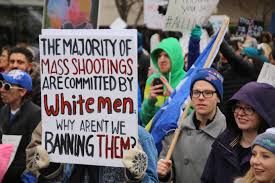Health
Social Engineering May Be Our Best Hope To Prevent Violence
We have one effective tool to minimize mass shootings AND sexual exploitation.
Posted February 22, 2018

Mass Shootings and Sexual Exploitation Have Some Things In Common
Violence and exploitative behavior now dominate press report and public conversation. The recent mass shootings in Florida, Las Vegas, and elsewhere, along with both the #MeToo movement emerging after the Harvey Weinstein sexual exploitation scandal and the youth sexual abuse scandal in USA gymnastics have galvanized action. While on the surface gun violence and sexual exploitation seem like very different and unrelated problems, they actually have many things in common from a behavioral science point of view.
First, the horrified and shocked public seeks immediate answers to avoid and prevent mass shootings and sexual exploitation of co-workers and youth, as well as a means for having some understanding as to how people can behave so heinously.
Second, many thoughtful and evidence-based ideas have been proposed to tackle both problems but, sadly and tragically, national politics and powerful individuals and organizations too often get in the way of any effective intervention or progress.
Third, the voices of experts in behavioral science within fields such as psychology, public health, criminology, and sociology are drowned out by advocates, politicians, lobbyists, and even celebrities. Remarkably, people seem much more interested in what Hollywood celebrities and sports stars think about these and other current societal threats than what actual experts in the field have to offer. It's these experts, after all, who are in touch with the best science and practices available.
Fourth, other countries and institutions have successfully managed problems like mass shootings and sexual exploitation by offering tried and true methods to safeguard their communities, yet their wisdom and experience is simply ignored.
The Role of Mental Illness
Many loud voices blame problems such as the spate of school shootings on the mentally ill. Yet, mental illness can be found across the globe while mass shootings are an ongoing chronic problem only in the USA. Furthermore, prejudice, bias, fear, and stereotyping still exist that highlight the false belief that those who suffer from “mental illness” are typically violent and ready to exploit the innocent at any opportunity. This is a common theme in Hollywood movies and television shows but it doesn’t reflect the reality that the vast majority of people who experience a mental health problem or illness pose very little danger to others. In fact, the most common mental health diagnoses include anxiety, depression, and alcohol problems that typically have nothing to do with either mass shootings or sexual exploitation of co-workers or youths.
The Challenge of Predicting the Future
Our best science and clinical practice from leading behavioral science experts is not very good at predicting future behavior. Among those who suffer from mental illnesses that are sometimes associated with violence (e.g., conduct disorders, antisocial personalities, paranoid psychosis) our predictive ability is poor. We may be able to examine risk factors and speculate if someone might be a low, moderate, or high risk of harming others but, at the end of the day, the best we have to offer typically is summarized with the statement, “the best predictor of future behavior is past behavior.”

Social Engineering is the Solution
So, if we are really interested in preventing mass shootings, sexual exploitation of vulnerable others, and other behavioral challenges in our society, our best tool is social engineering and not mental health screening, education, willpower, and so forth that is often proposed by many non-experts. Social engineering has been used successfully with so many problematic behaviors with impressive results. For example, there are far fewer traffic deaths with improved car safety features like quality seat belts and airbags. Another good example includes smoking cessation. Taxing cigarettes and preventing people from smoking in most public and many private locations have reduced cigarette consumption from about 60 percent to about 20 percent of the American population since the 1960s.
So, how might social engineering help with mass shootings and sexual exploitation?
The Boy Scouts and other youth organizations have successfully used the “two deep rule” to essentially eliminate sexual exploitation of scouts. Basically, this rule means that no adult can be alone with a scout and that at least two adults must be present when scouts are around. Applying this rule to the sexual exploitation of co-workers and youth would suggest that another trained health care professional, such as a nurse, must be present for physical exams with youth. This strategy would have prevented the chronic exploitation problems with Dr. Nasser and USA gymnastics. Private meetings with co-workers should also include other eyes on the scene as much as possible. And business should occur in professional environments and certainly not in hotel bedrooms as with the case of Harvey Weinstein.
In terms of gun violence, social engineering would suggest that people (regardless of their age, mental health status and, and so forth) should not have access to instruments of mass destruction such as military grade weapons unless they are on active duty with the military or law enforcement. You really don't want folks having easy access to high power, military style firearms. If too many people do, bad things will surely happen. After all, it only takes one person to do massive damage.
Willpower, mental health screening, education, and so forth simply can’t work as effectively as social engineering in terms of preventing violence and sexual exploitation in a country with well over 300 million diverse citizens and in a place where individual freedoms are sacrosanct. Even the experts, never mind politicians, advocates, and celebrities, can't offer a more powerful strategy for behavior change than social engineering to keep people safe within their communities. It is simply the best strategy that we have at our disposal. Perhaps we should use it more thoughtfully and aggressively until better evidence-based options are discovered.


